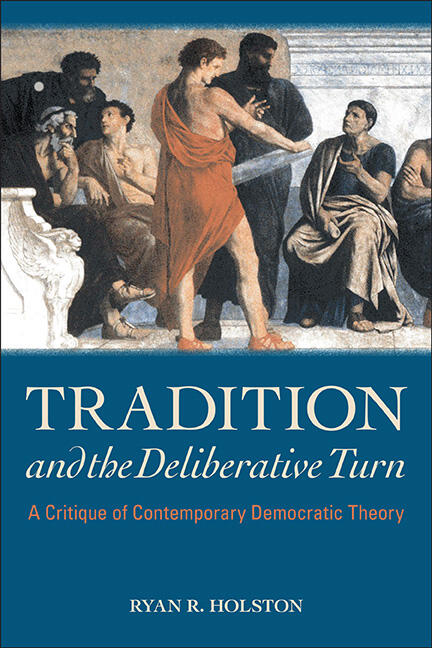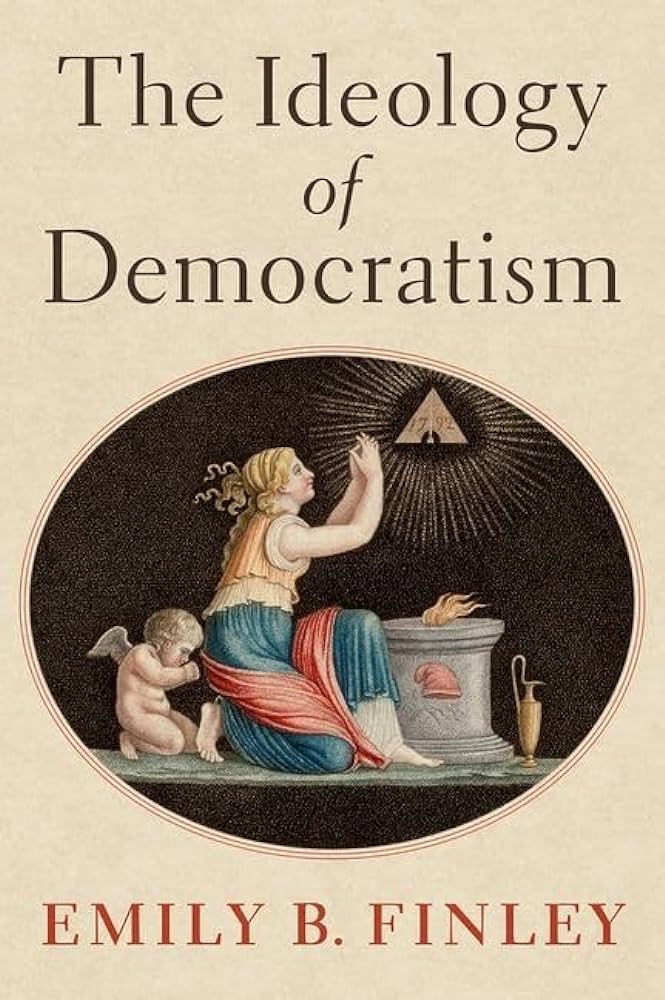Emily Finley and Ryan Holston have written powerful critiques of the ideology of democracy, which Finley terms “democratism.” Rooted in the work of that patron saint of revolution Jean-Jacques Rousseau, democratism launched modern radicalism and over time has become the dominant belief system operating in Western political and intellectual life.
Rousseau and his many followers, from Robespierre to Marx, and in America from Thomas Jefferson to Woodrow Wilson to the philosopher John Rawls and other icons of “democratic theory,” promised to liberate people from the “chains” of traditional institutions, beliefs, and practices. The result has not, however, been “democracy” in the sense of rule by the many. Rather, as Finley notes, democratists seek a legislator or vanguard of some sort “to midwife a new, truer Democracy . . . to encourage the ‘right’ democratic norms.”
Finley and Holston, who are co-editors of the scholarly journal Humanitas, both highlight democratism’s central irony, namely, its proponents’ consistent hostility toward popular majorities as “threats to democracy.” Elites within government, finance, and technology, as well as their supporters among media and nonprofit groups, seek to control ever-increasing areas of life in the name of the people, but generally against the express will of democratic majorities. The result is massive growth in centralized governmental power, along with an increasing delegitimization of our governing structures and way of life.
These books focus on different aspects of the ideology of democratism—Finley on its specifically political thought and implications for political and cultural institutions and practices, Holston on its corruption of our understanding of human nature and how (or whether) we can reason together in pursuit of the common good. Each stands on its own as an important contribution to our comprehension of a dangerous, prevalent doctrine actively undermining what is left of our civilization. Taken together, they offer a penetrating analysis of the false reality imposed on our conduct and way of thinking about political, cultural, and moral life and provide important guideposts for those seeking to reweave the fabric of our tradition.
The core of democratism lies in Rousseau’s vision of the General Will. This ideal expression of the popular will is distinguished from the mere “will of all” by each citizen’s having cast off the prejudices and experiences separating him from his true, inner self and from the “sacred voice of nature” that alone can guide him toward truly moral action. But democratism is not merely the creation of one mind. Both authors trace its roots beyond Rousseau. Holston presents a fascinating history of rationalism that points to epistemological issues going back to Plato. Both find a key turning point in the early modern writings of Thomas Hobbes and John Locke.
According to Finley, Hobbes laid “the groundwork for Rousseau’s understanding of a general will.” She cites a passage in which Hobbes says the people in a proper commonwealth “reduce all their wills by plurality of voices unto one will; which is as much as to say, to appoint one man or assembly of men to bear their person; and every one to own and acknowledge himself to be author of whatsoever he that so beareth their person shall act or cause to be acted in those things which concern the common peace and safety.” Here is the essence of the myth of “democracy,” of the view that masses can act rationally in political life without the aid of intermediary institutions in which they form relationships that breed common feeling and cooperation. In democratism the people are split up into mere individual wills and are deemed to “own” all the actions of their rulers because they have surrendered their wills to those rulers in the name of the common good.
Not surprisingly, democratists in positions of power use undemocratic means to impose what they see as the correct (and therefore “democratic”) policies on the people. What kind of policies? Liberationist policies. Policies that will “free” people from their past—tradition, habit, and associations such as families and churches that by nature bind them to specific, concrete communities and beliefs. Accordingly, centralized government has worked for decades to capture or kill local associations and communities and transform education into cultural indoctrination so that the people may take on a character strikingly similar to the Soviet model of a “new socialist man.”
Because democratism does not mean rule by the people, Finley avers, its proponents are free to concentrate power in the ruling classes, including political officials but also “more nebulous but arguably more powerful interests, such as those that control our news and means of communication.” Elites repeatedly declare emergencies, whether regarding “climate change,” “hate speech,” flu viruses, or any other topic they can redefine as a “public health issue.” They then point to these emergencies as justification for increased administrative power and campaigns censoring “misinformation” that presents inconvenient evidence or evinces loyalty to traditional institutions, beliefs, and practices.
Democratism itself has become a tradition over the centuries, although it has produced varying forms and justifications to address the challenges of subduing differing cultures. Western Europe succumbed decades ago to a democratic despotism in which elites have claimed—in the beginning often on “Christian” grounds—that they must regiment every aspect of their subjects’ lives to support “human dignity.” Within the United States, an anti-religious and anti-traditional Enlightenment rationalism formed in the writings of figures such as Thomas Paine and Thomas Jefferson. Finley emphasizes Jefferson’s role in working to deinstitutionalize religion and redesign education to “free” young people from the past as a means of preparing them to build an “empire of liberty.” Others followed, including Woodrow Wilson, whose war to “make the world safe for democracy” was waged at home with repressive measures aimed at dissenters who held the “wrong” views of democracy.
Perhaps most powerfully in recent decades, John Rawls constructed a form of “public reason” that pushes those deliberating moral and political issues to adopt a set of abstract criteria, posing as common sense, that dictate the rejection of concrete moral language, categories, and traditions. After this, contemporary progressives and their sometime (neo)conservative allies merely exaggerate and act out the plans of their forebears.
The thrust of democratist ideology is clear: mere popular democracy must be remade through “deliberative” democracy. Democratism requires, according to Finley, “deliberation ‘to help the citizens to understand better the issues, their own interests, and the interests and perceptions of others.’” And “where agreement is not possible, the deliberative democracy framework is supposed to help ‘structure and clarify the questions behind the conflict’ before the issues are finally put to a vote.” The popular will is not merely to be measured but shaped through leading questions, various forms of “nudging,” and values clarification to “educate” it into assumptions and values consistent with the General Will.
Holston focuses on precisely this aspect of democratism—the conditions imposed by the architects of deliberative democracy on how people are to reason together. This may sound like a technical issue, but it goes to the heart of the fraud that is democratic theory. Democratism in effect demands that the people be “forced to be free” from all the associations that make them fully human and, not coincidentally, that provide them with the means and motivation to resist the centralized powers radically transforming their lives to serve abstract goals like “diversity, equity, and inclusion.”
How to justify this? Holston does an admirable job of explaining the false logic and psychology behind what he terms the “autonomy tradition.” Looking largely to Rousseau’s important interpreter Immanuel Kant, as well as the contemporary Jürgen Habermas, Holston lays out the consequences of the drive for freedom understood as individual autonomy. Central here is the primacy of the will. Kant specifically holds that man’s distinctive moral worth resides not in an essential nature, understood in terms of any telos or predetermined purpose, but in his ability to resist the formative influence of historical experience and to become a self-determining agent. Tradition, laws, practices, and institutions (and, today, biology itself) cannot be allowed to determine one’s choices; such choices are literally willful or they are inauthentic and illegitimate.
As Holston explains it, the call for autonomy rests on the conviction that every human being has within himself a “sacred voice of nature” that is obscured, not just by prejudice, history, and tradition, but by emotion and experience itself. This voice is our true self, and the only voice that can lead us to express the General Will. To subject this voice to habits of any kind, to any force outside itself, is to “chain” it. Hence it is only to abstract principles (e.g., “justice as fairness”) and not to experience or human relationships that one must look in making “free” decisions.
In addition to being utterly self-willed, individual choices within the democratist orbit must be unanimous. Every single participant in political life must author every piece of legislation or it is illegitimate, period. But unanimity is impossible if those involved are shaped by different experiences, interests, and viewpoints. Tens of millions of people have been murdered by communist regimes seeking to make life sufficiently uniform to create unanimity of will. Deliberative democracy is a less overt and brutal means to this same end. But it achieves the end by imposing procedures and assumptions that twist reality and undermine moral action.
Holston’s most fundamental point is that deliberative democracy is quite literally at war with reality. Philosophers since the dawn of history have struggled with questions of how we can make moral decisions, especially when we act and reason with our fellows. How, amid the cacophony of circumstance, opinion, and prejudice, can we come to agreement on what is right to do in any specific situation? One solution, championed by Plato and other philosophers of a rationalist bent, is to set aside the particularities of concrete circumstances in favor of universal categories and principles; we can simply prioritize form over substance. Unfortunately, this view encourages contempt for human relationships and the common understandings they form, as well as for the inevitable pain that results when theoretical goods produce concrete harm.
The countercurrent in philosophy is represented most famously by Aristotle. It emphasizes the sense in which we all are social creatures, who, as Hans-Georg Gadamer notes, cannot help but think within traditions because we can understand our surroundings and fellows, and make reasonable attempts at communication, only through habit and experience. We can approach the world only as persons whose beliefs and practices already exist. Thus “prejudices” (or unthinking beliefs) are not dead weight from the past but the mental and social means necessary for us to take in and process new information. They may have moral or immoral implications but cannot be simply ignored or “rooted out” in favor of abstract principles; they must be engaged by people who seek to understand one another.
Holston places particular importance on the classical liberal idea that we can reason about the world around us before we have names for the objects, actions, and values with which we interact. He quotes P. Christopher Smith in arguing that, within this rationalist, individualist construct, “private individuals are assumed to think for themselves without having first heard the words for things from others, and only then do they import audible words into their thinking. . . . But in fact we never think in wordless ideas, but only in the words we have first heard from others and then hear again in our thinking.” Knowledge is not socially constructed; the world does, indeed, exist on its own. But we can only reason about the world, understand it and the duties we owe within it, in the context of a concrete, experience-based community that has formed names and meanings for its elements.
How is this relevant to democratism? The General Will rests on the assumption that truth and moral action are to be found in abstract concepts such as the “form” of justice rather than in concrete understandings such as that of justice as something lived in daily interactions or what in court are deemed the reasonable expectations of the parties to a given dispute. If justice is a matter of phrasing things correctly, of “assuming” the equal value of all occupational choices, for example, then we have passed beyond a world in which people reason together about how to achieve a better life into one in which all that matters is that we mouth the correct platitudes as we assign our wills to those entrusted with the real power to make choices consistent with The Plan.
Both Holston and Finley see the solution to the current despotism of democratism in a recovery of history and community. As Holston puts it, “concrete communities existing over time . . . alone are capable of furnishing the sensus communis from which shared meanings emerge, as well as the sound habits of thought that orient individuals toward a collective pursuit of the common good.”
Democratists reject this reality, not because it is too confining—their rationalist straightjacket binds much tighter than tradition ever could. They reject historical reality because it rules out their special place as avatars of the people and holders of the Truth to which all must conform. They claim to be “citizens of the world”—cosmopolitans beyond history and traditional morality whose high intelligence and abstract vantage point entitle them to rule. But their rationalism is quite narrow in its hostility to the variety of human experience and social relationships. Finley quotes Claes Ryn on this crucial point:
Truly cosmopolitan thinkers or leaders who see disturbing weaknesses in a people that they would like to see changed would not demand that the people abandon their historical heritage for a wholly different way of life assumed to be inherently superior. Fruitful, authentic change can only result from the particular society trying to be more fully itself, by living up to and in the process also revising its own highest standards.
Those who seek to short-circuit the hard work of meaningful debate, compromise, and disagreement in pursuit of concrete common goods in favor of grand plans that must be adhered to as matters of faith seek not the common good but their own satisfaction. “Democratic” or not, they are no friends to the people as persons, communities, or constitutive elements of a humane, civil social order.

















